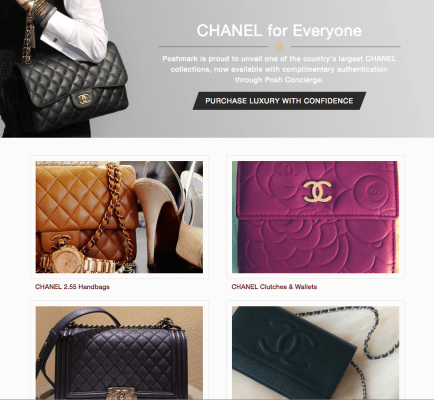Fashion marketplace Poshmark, which lets women shop for items sold from others’ closets, is now able to authenticate the purchases of luxury goods through a new service it’s calling “Posh Concierge.” The addition puts the previously peer-to-peer marketplace on a more even playing field with regard to competitors in the luxury goods/high fashion resale space like The RealReal, thredUP, Twice and others.
The new, free-of-charge feature comes at a time when Poshmark’s business, and its luxury segment in particular, is growing. The company exclusively tells TechCrunch that this month it hit a major milestone of a $100 million annual revenue run rate. To put that in perspective, The RealReal said in May it was expecting to do around $125 million in revenue this year. Many other startup competitors in the fashion resell market, however, keep their revenue figures private.
At launch, Poshmark has over 700,000 items that qualify for Posh Concierge.
Before Posh Concierge, most items sold through Poshmark’s marketplace were shipped directly from the seller to the buyer, as on eBay. But with the new service, luxury items can instead be sent to the Poshmark team of authenticators first, before they’re shipped to the recipient.
For items to qualify, they have to be over $500, the company says. It then provides the seller with a pre-paid, pre-addressed shipping label to send the item to the company. The verification process takes 24 to 48 hours, and, if approved, Poshmark then sends the item on to the buyer along with a certificate of authenticity.
[gallery ids="1090631,1090630"]
According to Poshmark founder and CEO Manish Chandra, Poshmark will now authenticate over 100 different designer brands, including top names like Chanel, Hermes, Louis Vuitton, Prada and Gucci. The authentications are handled by Poshmark’s operations team, and the items are authenticated by experts the company has partnered with around the country.
The new feature will likely attract a different type of user to Poshmark’s service: the professional seller. Whereas in the past many of Poshmark’s listings were those of someone just doing a little closet cleaning, pro sellers of luxury items will now be able to be confident of getting full price because they can prove to buyers their items are legit.
In addition, Poshmark’s business model appeals to sellers who want to set their own prices. Many professional sellers don’t like the marketplaces that play middleman, accepting and rejecting submissions, and sometimes paying minimally for items that sellers believe should be worth more. This ability, alongside Poshmark’s social features that allow buyers and sellers to directly communicate, has been helping Poshmark carve out its niche in a crowded market where there are now dozens of services for consumers to choose from for online consignments.
Fortunately for those others, the used clothing market in the U.S. is estimated to be between $15 billion and $18 billion – and so far it doesn’t appear to be a winner-take-all market.
